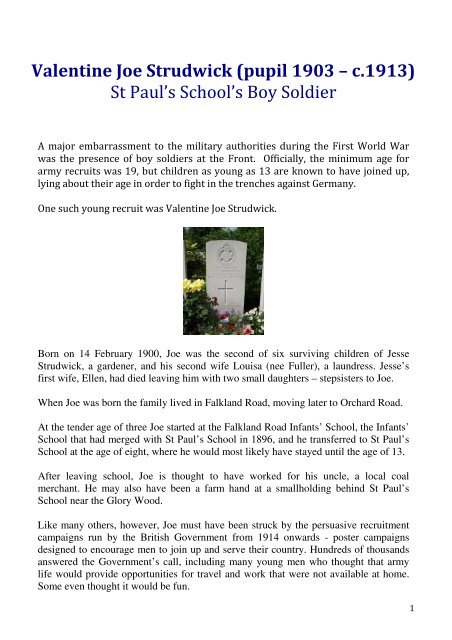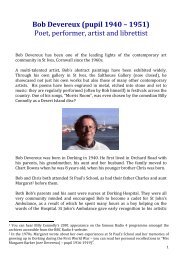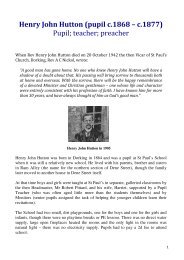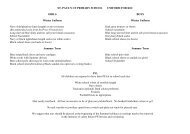Valentine Joe Strudwick - St Paul's C of E (Aided) Primary School
Valentine Joe Strudwick - St Paul's C of E (Aided) Primary School
Valentine Joe Strudwick - St Paul's C of E (Aided) Primary School
Create successful ePaper yourself
Turn your PDF publications into a flip-book with our unique Google optimized e-Paper software.
<strong>Valentine</strong> <strong>Joe</strong> <strong><strong>St</strong>rudwick</strong> (pupil 1903 – c.1913)<br />
<strong>St</strong> Paul’s <strong>School</strong>’s Boy Soldier<br />
A major embarrassment to the military authorities during the First World War<br />
was the presence <strong>of</strong> boy soldiers at the Front. Officially, the minimum age for<br />
army recruits was 19, but children as young as 13 are known to have joined up,<br />
lying about their age in order to fight in the trenches against Germany.<br />
One such young recruit was <strong>Valentine</strong> <strong>Joe</strong> <strong><strong>St</strong>rudwick</strong>.<br />
Born on 14 February 1900, <strong>Joe</strong> was the second <strong>of</strong> six surviving children <strong>of</strong> Jesse<br />
<strong><strong>St</strong>rudwick</strong>, a gardener, and his second wife Louisa (nee Fuller), a laundress. Jesse’s<br />
first wife, Ellen, had died leaving him with two small daughters – stepsisters to <strong>Joe</strong>.<br />
When <strong>Joe</strong> was born the family lived in Falkland Road, moving later to Orchard Road.<br />
At the tender age <strong>of</strong> three <strong>Joe</strong> started at the Falkland Road Infants’ <strong>School</strong>, the Infants’<br />
<strong>School</strong> that had merged with <strong>St</strong> Paul’s <strong>School</strong> in 1896, and he transferred to <strong>St</strong> Paul’s<br />
<strong>School</strong> at the age <strong>of</strong> eight, where he would most likely have stayed until the age <strong>of</strong> 13.<br />
After leaving school, <strong>Joe</strong> is thought to have worked for his uncle, a local coal<br />
merchant. He may also have been a farm hand at a smallholding behind <strong>St</strong> Paul’s<br />
<strong>School</strong> near the Glory Wood.<br />
Like many others, however, <strong>Joe</strong> must have been struck by the persuasive recruitment<br />
campaigns run by the British Government from 1914 onwards - poster campaigns<br />
designed to encourage men to join up and serve their country. Hundreds <strong>of</strong> thousands<br />
answered the Government’s call, including many young men who thought that army<br />
life would provide opportunities for travel and work that were not available at home.<br />
Some even thought it would be fun.<br />
1
In January 1915, aged just 14, <strong>Joe</strong> enlisted, joining the 8 th Battalion the Rifle Brigade,<br />
part <strong>of</strong> the 14 th (Light) Division - the battalion for volunteer soldiers. He was most<br />
probably trained at Winchester, and after only a few weeks’ preparation he was sent,<br />
with his Battalion, to the trenches at Boezinge near Ypres in Belgium.<br />
Conditions in the trenches were horrendous. They were muddy and filthy. Constant<br />
shellfire from enemy lines across ‘no man’s land’ meant soldiers died on a daily basis.<br />
Thousands more died in the major battles for the nearby town <strong>of</strong> Ypres.<br />
<strong>Joe</strong> died on 14 January 1916, not in any major battle but in the daily rounds <strong>of</strong> firing<br />
between Germany and the Allies. He was just 15 years, 11 months old. He is buried in<br />
Essex Farm Cemetery, near Ypres, and honoured on the Rolls <strong>of</strong> Honour in both <strong>St</strong><br />
Paul’s and <strong>St</strong> Martin’s churches, and on the War Memorial in South <strong>St</strong>reet.<br />
Dorking War Memorial, South <strong>St</strong>reet<br />
<strong>Joe</strong>’s death has become a symbol <strong>of</strong> the lunacy <strong>of</strong> the First World War and the shameful<br />
use <strong>of</strong> such young boys at the Front. His grave is now one <strong>of</strong> the most visited in any <strong>of</strong><br />
the First World War cemeteries.<br />
Essex Farm Cemetery - then Essex Farm Cemetery – now<br />
HMW June 2011<br />
2
Another Dorking lad has achieved honour by laying down his life for his<br />
country.<br />
Pte. <strong>Valentine</strong> <strong>Joe</strong> <strong><strong>St</strong>rudwick</strong>, <strong>of</strong> the 8 th Rifle Brigade, joined up twelve months<br />
ago last January, and at the time <strong>of</strong> his death, on Jan. 14 th, he had not reached<br />
his sixteenth birthday, he having been born on <strong>St</strong>. <strong>Valentine</strong>’s Day, 1900.<br />
His mother would naturally have liked to have kept him out <strong>of</strong> the Army for at<br />
least a year or two, but young <strong><strong>St</strong>rudwick</strong> would not have it – a fine example to<br />
those <strong>of</strong> maturer years who have not yet joined, and perhaps a reproach!<br />
With only six weeks’ training the lad was sent over to France. Within a short<br />
time he lost two <strong>of</strong> his chums who were standing near him – both<br />
instantaneously killed. The shock was such, with the addition <strong>of</strong> being badly<br />
gassed, that he was sent home and was for three months in hospital at<br />
Sheerness. On recovering he rejoined his regiment in France, and this week<br />
his mother received the following letter from his commanding <strong>of</strong>ficer, dated<br />
Jan. 15 th :<br />
‘I am very sorry indeed to have to inform you that your son was killed by a<br />
shell on Jan. 14 th . His death was quite instantaneous and painless and his<br />
body was carried by his comrades to a little cemetery behind the lines, where<br />
it was reverently buried this morning. A cross is being made and will shortly<br />
be erected on his grave. Rifleman <strong><strong>St</strong>rudwick</strong> had earned the goodwill and<br />
respect <strong>of</strong> his comrades and <strong>of</strong> his <strong>of</strong>ficers, and we are very sorry indeed to<br />
lose so good a soldier. On their behalf as well as my own I <strong>of</strong>fer you our<br />
sincere sympathy.’<br />
The deceased was Mrs <strong><strong>St</strong>rudwick</strong>’s second surviving son, and her grief is the<br />
greater because <strong>of</strong> the fact that she had not been able to see him since he<br />
joined the Army. She has another son in the Royal Field Artillery.<br />
Young <strong><strong>St</strong>rudwick</strong> was an old <strong>St</strong>. Paul’s boy.”<br />
Dorking Advertiser - 22 January 1916<br />
3











